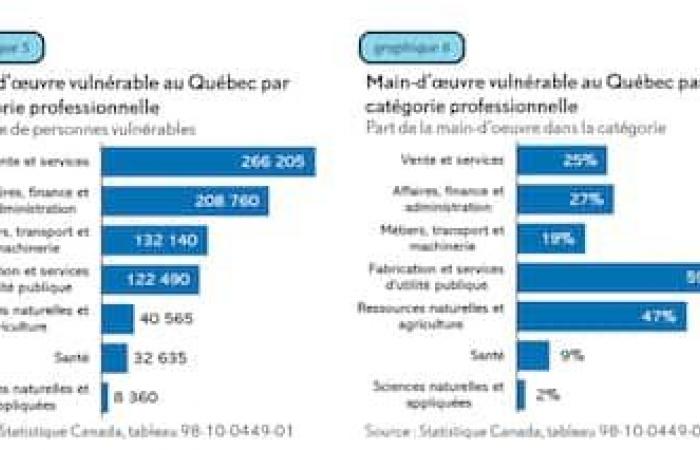Cashiers, cashiers, administrative assistants, accounting auditors… the Institut du Québec (IDQ) estimates that nearly one in five Quebecers in the job market is at risk with the surge of artificial intelligence ( AI).
• Also read: Artificial intelligence: is your job at risk of being replaced?
• Also read: Artificial intelligence: here is the list of the 100 jobs most at risk
• Also read: Future job losses with artificial intelligence: a committee urges Quebec to act
“Approximately 810,000 Quebecers, or 18% of the active population, work or seek employment in the 96 professions identified as being vulnerable to automation,” observes Emna Braham, CEO of the Institut du Québec (IDQ), in a study which appeared this Wednesday.
Nearly one in five Quebecers on the job market “occupies positions with a high risk of automation without the possibility of rapid professional retraining.”
Table provided by IDQ
Modernize the laws
Last February, the Quebec Innovation Council (CIQ) had already sounded the alarm by demanding an urgent modernization of labor laws to prevent advances in AI from hitting the sector head-on. job market in Quebec.
“Among adults aged 25 and over, it is workers without a diploma who are most at risk: 27% of them hold or are looking for work in a vulnerable profession,” explains Anthony Migneault, senior economist at the IDQ. .
Since the arrival of ChatGPT two years ago, the public has begun to concretely understand the extent of the potential of AI in our daily tasks.
What is brewing in the world of work in Quebec will create a shock wave.
Table provided by IDQ
Last July, The Journal has published a major report on the impact of AI on the job market. The IDQ study confirms that the challenges are upon us.
“Although women represent 48% of the active workforce in Quebec, they account for 52% of the workforce vulnerable to automation. […] They are particularly affected and over-represented in certain professions, notably administrative assistants and receptionists,” concludes the IDQ.
—
Highlights
According to Bloomberg Intelligence, banks will cut up to 200,000 jobs over the next three to five years worldwide.







